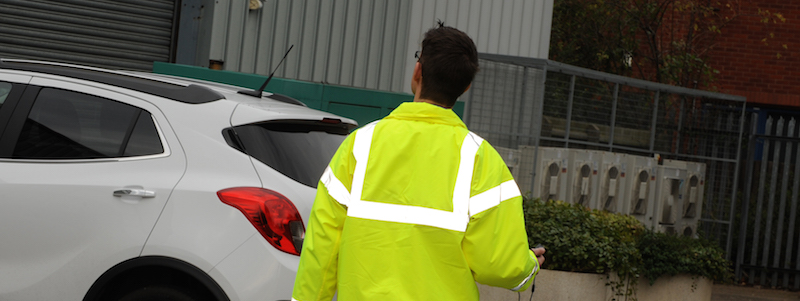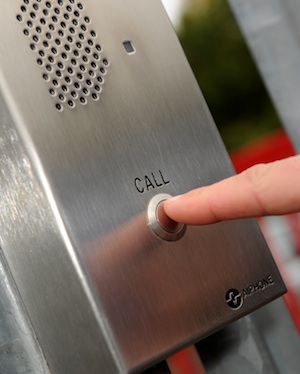The type of crime a business is at risk from depends on a huge number of factors. Business security threats they face can depend on a business’ location, size, industry, accessibility and much, much more.
But there is no doubt that businesses of all sorts face security threats. A recent report published by the Home Office – Crime against businesses: findings from 2018 Commercial Victimisation Survey:
- In the transportation & storage sector there were a staggering 2,755 crime incidents per 1,000 premises
- Vandalism, theft and burglary were the most common types of crime experienced by the agricultural sector
- Often with attractive high value assets on site, the construction sector has 910 incidents per 1,000 premises
The above statistics not only show a snapshot of the prevalence of crime against businesses but they also highlight the variety of crime businesses can be victims of.
The following tips are focussed on best practice security for businesses in all sectors: whatever the size of your site, its location, the inventory on site, or the nature of your business.
1. Make one person responsible for overseeing security
 Identify a trustworthy, longstanding employee who you could make project manager of your site’s security. That person could be yourself, or someone who you believe has the spare capacity to oversee all matters ‘security’. This does not necessarily mean they need to be an expert in everything from access control to cybersecurity, but instead that they are able to:
Identify a trustworthy, longstanding employee who you could make project manager of your site’s security. That person could be yourself, or someone who you believe has the spare capacity to oversee all matters ‘security’. This does not necessarily mean they need to be an expert in everything from access control to cybersecurity, but instead that they are able to:
- Track and monitor who is privy to security information
- Be a point of contact for service providers, such as security systems maintenance teams and your alarm receiving centre
- Be responsible for ensuring security systems are maintained
- Be responsible for updating keyholder information
- Be the site owner’s point of contact for security information
2. Put a maintenance plan in place
If you, as the customer, have a maintenance plan in place you’ll help reduce avoidable false alarms and potentially costly replacements of security equipment before their time.
Find out what points you should cover in your plan in our end-user maintenance guide.
3. Contract an installer
Many believe that having a maintenance contract in place with an installer is an unnecessary monthly expense. However, the expertise a knowledgeable installer can offer is invaluable – they will be able to make sure systems are up-to-date, false alarms are quickly addressed and issues are dealt with before they compromise your site’s security.
4. Regularly review technology in place
This can be something your contracted security installer can help with. Technology in the security industry is always advancing and as a result there may be a new product on the market that could enhance your security and offer further benefits.
Of course, there is most likely an expense in upgrading your systems so you will need to assess how cost-effective it may be. However, being aware of new technology will help you to make a decision on upgrading when the time is right.
Extra tip: Make sure the surrounding infrastructure you have in place (for example, your Internet) is capable of supporting new security technology.
5. Check for site changes
This is particularly important for larger sites. Anyone – from your facility manager to an individual employee – could make a change to your site that could pose a potential security risk. For example, people may start to park near perimeter fencing, making it easier for intruders to gain access, or new foliage may be planted near CCTV cameras.
Complete regular site checks so you’re aware of these changes and can report them to your security company if you believe they may become problematic.
6. Check for planned IT and system updates
This is particularly important for remote monitoring stations and alarm receiving centres. If there are scheduled IT or system updates in place, make sure you let your remote monitoring station know in advance. If the network goes down – even momentarily – it could cut their connection to your site and compromise your security. It may also mean certain steps need to be taken to ensure the connection is re-established.
Similarly if your systems go down unexpectedly, make sure you let your remote monitoring station know as soon as possibly so they can check their connection with your site.
7. Look at what CCTV footage is captured
Check what footage your remote monitoring station receives. This could provide insight on the level of detail you could obtain on intruders and throw up questions about whether your CCTV needs to be adjusted to help you achieve your security objectives.
8. Be clear on your security objectives
Make sure you know what you want to achieve from your security system. Do you want to monitor the flow of people to and from your site? Do you require number plate recognition? Do you need high definition to satisfactorily identify potential intruders?
9. Keep security details to a few
Don’t over-share security details. Be conscious of who knows what and why they require that information. For example, know who has access to password information and ensure you update those details if an employee leaves.
Find out how to protect your business from an inside job; read our blog on security from the inside, out.
10. Have the right keyholders in place
Regularly review your list of keyholders. Are they genuinely going to be able to respond in a timely and appropriate manner to a security incident?
Beyond whether or not the right keyholders are in place, double-check their contact details. If they have a new phone number and the remote monitoring station cannot contact them in an emergency there could be serious delays to how swiftly an incident can be dealt with.
Find out more about the role keyholders in our blog.
11. Consider seasonal changes
As the seasons change, so do the security requirements of your site. Changing daylight hours, weather conditions and more can all impact on CCTV and intruder alarm systems.
When it comes to winter, double check your security lighting is sufficient. For summertime security advice, have a read of our blog on how to optimise your security during the summer months.
12. Stay on top of the bills
Don’t let the bills for your Internet, electricity or phone line go unpaid – it could result in your CCTV and security systems being cut off, ultimately leaving your site vulnerable.
13. Have a crisis management plan in place
Security incidents happen, as the statistics from the Commercial Victimisation Survey show. As a result, sites need to have an effective crisis management plan in place that details points of contact, how to deal with different scenarios and information such as assembly points and how you will review the crisis at a later date to prevent it happening again.
14. Understand how your current security system is performing
Your remote monitoring station and alarm receiving centre should be able to provide you with a report on how your security is performing.
15. Be careful what you share
A particularly important factor for small businesses: check what you’re sharing to the outside world. Does your out-of-office state that your business will be closed for a specified period? This could be a clue to opportunistic thieves that your business is unoccupied and vulnerable.
16. Communicate with your remote monitoring station
Has there been a change to working patterns? Are you expecting building work to take place? Will the perimeters of your site be changing?
Make sure you let your remote monitoring station know of changes from employee movements through to changes that might happening off-site – such as a new business moving in next door. All of this information can help operators at the remote monitoring station to review CCTV footage more accurately.
 17. Think beyond your site
17. Think beyond your site
Sometimes security risks do not happen directly on your site. For example, should you be considering lone worker protection when employees are off site?
Similarly, are building works happening nearby that could lead to increased traffic near and potentially through your site? Is there an event occurring nearby? Assess the level of risk each change poses and consider what measures you can put in place to reduce those risks.
18. Consider sector specific risks
As has already been mentioned, different businesses will face a different set of risks depending on their sector. Retailers will be concerned about reducing shoplifting, whereas farmers may be more considered about vandalism.
Look at industry reports on the levels and types of crime and consider whether they apply to your business. From there, talk to a security expert who can help you minimise any potential risks.
19. Use signs to deter criminals
Deter criminals from your site by clearly displaying CCTV signs. Although the yellow and black signs we’re all familiar with are a legal requirement, we would also highly recommend displaying signs stating that your CCTV is being monitored live by security professionals. Signs such as these can often be provided by your remote monitoring station.
 20. Monitor access
20. Monitor access
Finally, consider whether it is worth introducing access control to your site. If there are many people coming and going, access control can give you peace of mind in knowing that only authorised individuals are accessing your premises.
There’s a wealth of information available out there on how to improve your business’ security but the above gives you a great starting point. And one last point…
Make sure security professionals remotely monitor your CCTV.
Begin improving your security today; find out more about our remote monitoring services here at Farsight.
If you would like to discuss your business security measures with Farsight, talk to our experienced team today. Call us on 0845 371 0101 or email us via our online contact form.





